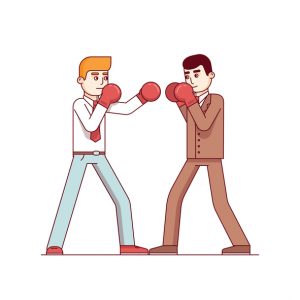
Canelo Alvarez has initiated a lawsuit based on what he claims to be the breach of the single largest contract in the history of boxing and one of the largest contracts in all of sport. The complaint, filed on September 8 in the U.S. District Court for the Central District of California, includes Alvarez’s longstanding promoters Golden Boy Promotions and Oscar De La Hoya, as well as sports broadcaster DAZN, as defendants.
Alvarez says that, in October 2018, he committed to a five-year, 11-fight deal with DAZN that was said to be worth a minimum of $365 million. Twenty-three months later, after Alvarez fought in only three boxing matches (all victories), he is suing for damages of at least $280 million.
The complaint reveals that Alvarez appears to not be certain that the $365 million contract was entered into by the relevant parties. The beginning of the general allegations section is premised on information and belief that Golden Boy Promotions and DAZN entered into such a contract. Later on, Alvarez says he is informed of and believes that the contract required DAZN to pay Golden Boy Promotions a licensing fee of $40 million per bout for 10 bouts, with a reduced fee for a December 2018 fight against Rocky Fielding. Another upon information and belief sentence says that there was an expectation and understanding that the bulk of the licensing fees would flow to Alvarez as his purse for the bouts.
Alvarez explains that he has repeatedly asked for copies of the contract and that both Golden Boy Promotions and DAZN have refused to share whatever may exist to support the alleged contractual relationship.
While Alvarez has not been able to get his hands on any contract between Golden Boy Promotions and DAZN, he is sure that he signed a separate agreement with Golden Boy Promotions that required the promotions company to pay Alvarez a total of $365 million for 11 boxing matches, and the contract purportedly includes a clause whereby Golden Boy Promotions’ CEO, Oscar De La Hoya, personally assumed liability for all guaranteed payments.
As is true for many individuals and corporate entities, problems surrounding the business relationships sprouted with the coming of the coronavirus pandemic. According to the complaint, after a temporary pause, the parties resumed discussions about 2020 bouts in May, with Alvarez indicating he was ready and able to face world-class opponents in September and December. A dispute arose when, in June, DAZN said it would not pay the license fee and allegedly used Alvarez’s failure to fight professional boxer Gennady Golovkin in 2019 as an excuse.
“After extended discussions between the parties, DAZN offered to pay Alvarez and Golden Boy Promotions a fraction of the contracted $40 million license fee in cash and some DAZN stock in advance of a potential IPO. However, the entire value of the package — for a bout against another World Champion — was substantially less than Alvarez’ contractual guarantee,” the complaint states.
Alvarez says that he has asked Golden Boy Promotions to explore alternative broadcast options for a Fall 2020 bout but no alternative plans have been provided that would compensate Alvarez with the $35 million per bout that he believes he is owed.
The complaint has 10 counts, including a cause of action for declaratory relief whereby Alvarez asks the court to determine the legal rights and duties of the parties, such as whether he is able to participate in bouts arranged and promoted by entities other than Golden Boy Promotions and broadcast by entities other than DAZN based on each of their alleged breaches.
Darren Heitner is the founder of Heitner Legal. He is the author of How to Play the Game: What Every Sports Attorney Needs to Know, published by the American Bar Association, and is an adjunct professor at the University of Florida Levin College of Law. You can reach him by email at heitner@gmail.com and follow him on Twitter at @DarrenHeitner.

